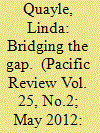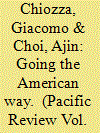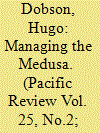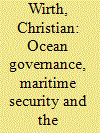|
|
|
Sort Order |
|
|
|
Items / Page
|
|
|
|
|
|
|
| Srl | Item |
| 1 |
ID:
123145


|
|
|
|
|
| Publication |
2012.
|
| Summary/Abstract |
The objective of a 'people-oriented' Association of Southeast Asian Nations (ASEAN) has not readily translated into easy relations between the Association and regional civil society. Discourse inspired by global civil society has found plenty to focus on in the gap between aspiration and practice. This article argues, however, that not enough attention has been directed to the bridges that are gradually forming across that gap, and suggests that an 'English School'-derived account can give a fuller picture of what is under way in this area. From this perspective, a process of institutionalization is observable among the different actors. By tackling - consciously or unconsciously - core problems such as recognition, location of common ground, confidence-building, and burden-sharing, this process is potentially transforming the relations of a state-imposed hierarchy into something more societal. The usefulness of such an approach lies in its ability to describe a process of slow change on its own terms, to normatively validate the fragile bridges under construction, and to stake out possibilities for progress on the basis of negotiation and accommodation.
|
|
|
|
|
|
|
|
|
|
|
|
|
|
|
|
| 2 |
ID:
123148


|
|
|
|
|
| Publication |
2012.
|
| Summary/Abstract |
Despite many predictions to the contrary, the Republic of Korea (ROK) is currently one of the countries with most pro-American attitudes. We investigate what is behind the extraordinary resilience in US popular standing in an allegedly least likely setting. Using survey data from 2002 and 2007 and a novel methodology, Classification and Regression Tree models, we test whether US standing is: (1) a matter of interests, i.e. a reward that the USA receives because it either provides security or international public goods; or (2) whether it is a matter of image, i.e. the recognition that the USA is a role model to emulate. We find that across a large number of predictors, the Korean public mostly liked the USA because they liked American ways of doing business, which gives support to the image hypothesis. Security interests played a secondary role in shaping US standing, while the provision of international public goods had no impact in the popular assessment of the USA in the ROK.
|
|
|
|
|
|
|
|
|
|
|
|
|
|
|
|
| 3 |
ID:
123144


|
|
|
|
|
| Publication |
2012.
|
| Summary/Abstract |
This article explores the ways in which Japan manages its bilateral relationship with the USA. It contributes to the extant literature on Japan-USA bilateral relations by focusing particularly upon the management of this core bilateral relationship from a Japanese perspective and within two mechanisms of global governance, the G8 and G20 summits, collectively referred to as GX summitry. Specifically, the article highlights the various strategies and tactics instrumentalized by Japan in managing its bilateral relationship with the USA in this context, in addition to evaluating how successful they have been and contrasting them with the strategies adopted by the UK as another member of the G8 and G20 that maintains a 'special relationship' with the USA.
|
|
|
|
|
|
|
|
|
|
|
|
|
|
|
|
| 4 |
ID:
123146


|
|
|
|
|
| Publication |
2012.
|
| Summary/Abstract |
High economic growth rates, the revolution in telecommunications and the end of the Cold War have brought about rapid and profound changes to the domestic as well as regional environments of Northeast Asian governments. The maritime sphere, where increasingly militarized state boundaries delineate political authority and economic activities link increasingly interdependent communities therein, bears high significance for the study of regional cooperation. This paper looks at how the maritime sphere of Northeast Asia is represented in common political and academic discourses of international relations. It finds that maritime affairs are firmly cast in the language of national security, and that empirical evidence against perceived threats and related security imperatives is often neglected if not completely ignored. The paper argues that the maritime space, due to its special character, has become the stage on which the consequences of modernity appear particularly strong. The relentless quest to develop and control the ocean clashes with the notion of the sea as a space of global trade and communication flow. At the same time, the ocean as an entity itself is excluded from the discourse because it is irreconcilable with the conception of the international system of sovereign territorial units. As a result, the maritime sphere is seen as a dividing element between nations rather than a connecting element, and salient environmental problems of the maritime space remain low on political and academic agendas. This is also a consequence of mainstream methods of political science that continue to reproduce discourses of territorial division and fail to offer alternative approaches suitable for the study of contemporary Northeast Asia.
|
|
|
|
|
|
|
|
|
|
|
|
|
|
|
|
| 5 |
ID:
123147


|
|
|
|
|
| Publication |
2012.
|
| Summary/Abstract |
In October 2010, the European Union (EU) and the Republic of Korea signed a free trade agreement that went into effect in July 2011 and aims to increase levels of bilateral trade and investment by dismantling existing tariff and non-tariff barriers. In this article, we highlight the importance of a third class of barriers: social, cultural and institutional barriers to trade with and investment in Korea that cannot be legislated for under the new agreement but that can serve as 'hidden stumbling blocks' to its implementation and effectiveness. We argue that the phenomenon of 'mismatched globalization' (in which economic globalization outpaces cultural globalization) is still apparent in Korea, as evidenced by the continuing existence of these 'soft' barriers which include, inter alia, the gap between policy and implementation; the lack of predictability, consistency and transparency in the regulatory environment (including IPR protection); education systems; labour militancy; and attitudes towards globalization. These findings resonate with Dent's (2006) argument that 'deficient capacity' in terms of technocracy, industry and/or institutional arrangements can pose problems for developing countries seeking to negotiate and implement bilateral trade agreements with more developed countries. In the case of Korea, the long-term 'soft' social, cultural and institutional barriers identified and discussed in this article act as a constraint on the country's institutional capacity functions and thus have the potential to hinder the full and effective implementation of the EU-Korea Free Trade Agreement and reduce the economic benefits that the signatory parties hope to gain from it.
|
|
|
|
|
|
|
|
|
|
|
|
|
|
|
|
|
|
|
|
|